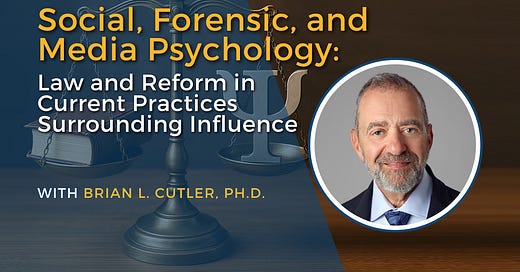Social, Forensic, and Media Psychology: Law and Reform in Current Practices Surrounding Influence
With Brian L. Cutler, Ph.D.
The law is out of date on topics regarding how the mind works and how much social influence can sway people to do and believe things that are not common sense. This was one of the main inspirations for my doctoral work at Fielding Graduate University. I was honored to speak with Dr. Brian L. Cutler, Ph.D., on this episode of Cult Conversations: The Infl…
Keep reading with a 7-day free trial
Subscribe to Dr. Steven Hassan to keep reading this post and get 7 days of free access to the full post archives.





